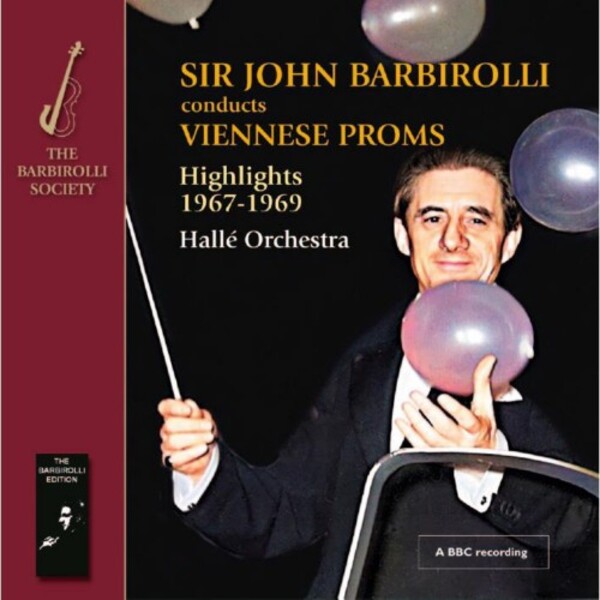
Barbirolli conducts Viennese Proms: Highlights
£13.25 £10.60
save £2.65 (20%)
special offer ending 27/05/2024
Usually available for despatch within 3-5 working days
Despatch Information
This despatch estimate is based on information from both our own stock and the UK supplier's stock.
If ordering multiple items, we will aim to send everything together so the longest despatch estimate will apply to the complete order.
If you would rather receive certain items more quickly, please place them on a separate order.
If any unexpected delays occur, we will keep you informed of progress via email and not allow other items on the order to be held up.
If you would prefer to receive everything together regardless of any delay, please let us know via email.
Pre-orders will be despatched as close as possible to the release date.
Label: Barbirolli Society
Cat No: SJB111011
Format: CD
Number of Discs: 2
Release Date: 21st April 2023
Contents
Works
Symphony no.83 in G minor, Hob.I:83 'The Hen'Gold und Silber (Gold and Silver), op.79
An der schonen blauen Donau (On the beautiful blue Danube), op.314
Der Zigeunerbaron (The Gypsy Baron)
Kaiserwalzer, op.437
Perpetuum mobile, op.257
Rosen aus dem Suden, op.388
Tritsch-Tratsch Polka, op.214
Der Rosenkavalier: Suite (arr. Artur Rodzinski)
Artists
Halle OrchestraConductor
John BarbirolliWorks
Symphony no.83 in G minor, Hob.I:83 'The Hen'Gold und Silber (Gold and Silver), op.79
An der schonen blauen Donau (On the beautiful blue Danube), op.314
Der Zigeunerbaron (The Gypsy Baron)
Kaiserwalzer, op.437
Perpetuum mobile, op.257
Rosen aus dem Suden, op.388
Tritsch-Tratsch Polka, op.214
Der Rosenkavalier: Suite (arr. Artur Rodzinski)
Artists
Halle OrchestraConductor
John BarbirolliAbout
On the first CD in this double-album, the second of Haydn’s six ‘Paris’ symphonies is followed by four works by Johann Strauss II – the Overture to Die Fledermaus is followed by arguably the greatest of Strauss’s waltzes – the Emperor Waltz (Kaiser-Walzer), a large-scaled concert waltz, full of original melodic inspiration and beautifully orchestrated in the composer’s finest symphonic manner. The Emperor Waltz – from 1888 – is full of true Viennese lilt and spontaneity. This most infectious of dances is followed by two very different yet equally popular jeux d’esprit from around thirty years earlier – the Tritsch-Tratsch Polka of 1858, and the brilliant Perpetuum mobile – a genuine orchestral scherzo in 2/4 from 1861 – in which performances Barbirolli and the Hallé judge the civilised expressions throughout to a nicety.
Richard Strauss was no relation to the Austrian Strausses, although he did write a number of waltzes, principally in his operas, the most famous being Der Rosenkavalier. Barbirolli first conducted Der Rosenkavalier in December 1931 with the Covent Garden Opera Company: in all, Barbirolli conducted the opera on sixteen occasions throughout his career, and gave well over one hundred performances of the orchestral suite. Such was the fame of Der Rosenkavalier that there were frequent demands for excerpts for concert performance, but it was not until 1944 that a purely orchestral suite was put together by Artur Rodzinski.
If the family of Johann Strauss I exemplified the musical heart of Viennese light music, their influence was widespread and lasting, and amongst the composers who followed in their wake, Franz Lehár was one of the most successful. His most famous stage work is the operetta The Merry Widow (1905), and the melodious waltz Gold and Silver is his most famous concert work, comparable with the best of the Strauss family.
On the second CD we start with Johann Strauss II and his The Gypsy Baron Overture. This is followed by a further selection from his vast output: three immortal waltzes – Tales from the Vienna Woods, Roses from the South and The Blue Danube, interspersed with three polkas and the brilliant Perpetuum mobile – in which last piece it has been said how a man of talent can go on improvising almost indefinitely on a given harmonic and rhythmical basis – a conundrum Barbirolli and the Hallé demonstrate and solve admirably.
Yet it is surely the Viennese waltz which demands a more inherent grasp of style: a slight anticipation of the second beat, sudden pauses, insinuating slight changes of tempo, the flick of the grace-notes – all of such unwritten but always implied characteristics are mastered in Barbirolli’s splendid performances: an interpretative style that is as rarely encountered today as it was sixty years ago at the Proms.
A ‘bonus’ track has an encore of the Lehár’s waltz Gold and Silver from Proms on 29 August 1953.
Error on this page? Let us know here
Need more information on this product? Click here